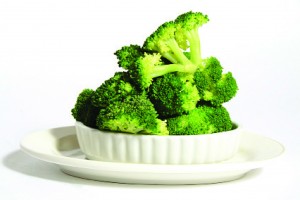By Ronna L. Clements,
Natural Health & Wellness
Innovator
 Broccoli was grown in France and Italy in the sixteenth century, and it was not well known in this country until the early 1900’s when the D’Arrigo Brothers Company made a trial planting of Italian sprouting broccoli in California.
Broccoli was grown in France and Italy in the sixteenth century, and it was not well known in this country until the early 1900’s when the D’Arrigo Brothers Company made a trial planting of Italian sprouting broccoli in California.
A few crates were sent to Boston and by 1925 the market was well established. Since then, the demand for broccoli has greatly increased and today it is a very popular food.
California, Arizona, and Texas are the main broccoli producing states. It is a member of the cabbage family and can be gas forming, but if cooked in a steamer or over a low fire, this may be avoided. Broccoli is best if undercooked because it leaves a higher chlorophyll content in the vegetable. This is not only good for the cells and tissues of the body, but the higher chlorophyll content will counteract the sulfur compounds that form gas.
When choosing broccoli, look for tenderness in the stalk especially the upper portion. If the stalk is tough and if the bud clusters are open and yellow, the broccoli is over-mature and it will not be as tasty. Fresh broccoli does not keep a long time so purchase only as much as you can immediately use. Fresh is always best.
One of the therapeutic values of broccoli is that it lies within the cabbage family and if eaten with protein, the combination will help drive amino acids to the brain. Broccoli is high in vitamin A (9,700 International Units) and vitamin C (325 mgs), low in calories, and it is beneficial to the digestive and eliminative systems.
A second therapeutic value of broccoli is that it is an outstanding food that helps to prevent cancer cells from flourishing. How do we know this is true?
As a specialist in Cellular Regeneration, I stay abreast of quality research studies on the subject of food as it relates to cellular rebuilding. A study at Georgetown University reported in the British Journal of Cancer found that indole-3-carbinol is a chemical in specific vegetables such as broccoli, cauliflower, and cabbage, and this compound can actually boost DNA repair in cells and may stop them from becoming cancerous.
This is a crucial finding because DNA is the material inside the nucleus of the cell that carries genetic information. This is certainly positive to know because if some individuals are genetically predisposed to cancer, cellular repair can be done by regularly eating this amazing food. It’s fascinating and scientists are pursuing this line of study.
Professor Eliot Rosen led the study and he quotes, “it is now clear that the function of crucial cancer genes can be influenced by compounds in things we eat. Our findings suggest a clear molecular process that would explain the connection between diet and cancer prevention.”
The leaders in the field of anti-aging have stated as long as 25 years ago the importance of including broccoli in one’s diet.
So, there it is – some interesting information. You never thought something like broccoli could be so wonderful.
The next time you see it in the produce aisle, remember this article and think about buying a few stalks. You just may end up loving it.
Bon appetit mes amis!
© Ronna Clements Corporation – All Rights Reserved – 2015
Check Also
WHY DO I FEEL SO TIRED ALL OF THE TIME, AND NOTHING WAKES ME UP?
By Renee Chillcott, LMHC When it comes to a feeling we can’t tolerate and want …
 South Florida Health and Wellness Magazine Health and Wellness Articles
South Florida Health and Wellness Magazine Health and Wellness Articles




